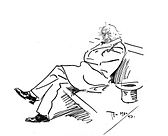Phil May (1864 - 1903) The George Hotel
Phil May was born in Wortley, near Leeds, the son of an engineer who died when May was nine years old. His mother was the daughter of Eugene Macarthy, one time manager of the Theatre Royal, Drury Lane. She was left in very poor circumstances and the family struggled. May visited Whitby many times during his lifetime.

May's grandfather, a country gentleman, had some talent as a draughtsman and liked drawing caricatures. At the age of twelve, in Leeds, May became friendly with Fred Fox, whose father was the scenic artist at the recently opened Grand Theatre. That gave him a free run of the theatre, where he used to sketch sections of other people's designs for costumes, as well as sketching actors' portraits, for which he received one shilling, later rising to five shillings. Another of his contemporaries was Walter Curtis, who became prominent as a music hall comedian and general entertainer.
May had begun to earn his living in a solicitor's office; before he was fifteen he had acted as time-keeper at a foundry, had tried to become a jockey and had been on the stage at Scarborough and Leeds. When he was fourteen he had drawings accepted for the Yorkshire Gossip. At seventeen he went to London with a sovereign in his pocket. He suffered extreme want, sleeping out in the parks and streets until he obtained employment as designer to a theatrical costumier. He also drew posters and cartoons, and for about two years worked for the St Stephens Review until he was advised to go to Australia for his health.
During the three years (1886–1889) he spent in Australia he was attached to The Sydney Bulletin, or The Bulletin as it was better known, for which he produced about 800 drawings. On his return to Europe he went to Paris by way of Rome, where he worked before appearing in 1892 in London to resume his connection with the St Stephens Review.
It was often said that the extraordinary economy of line which was a characteristic feature of his drawings had been forced upon him by the deficiencies of the printing equipment of the Sydney Bulletin. It was in fact the result of a laborious process which involved a number of preliminary sketches, and a carefully considered system of elimination. His later work included some excellent political portraits. He became a regular member of the staff of Punch in 1896, and in his later years his services were retained exclusively for Punch and The Graphic. In 1898, he was a founder member of the London Sketch Club. He died from tuberculosis in 1903 at his home in St John's Wood, London.

William Ewart Gladstone, 1890

Information wanted: 'Say, boy, do my boots want cleaning? 1891

